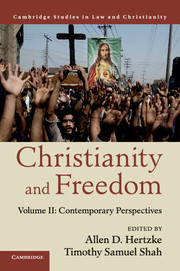Book contents
- Frontmatter
- Colophon
- Contents
- Contributing Authors
- Acknowledgments
- Introduction: Christianity and Freedom in the Contemporary World
- 1 Persecution in the Context of Religious and Christian Demography, 1970–2020
- 2 Patterns and Purposes of Contemporary Anti-Christian Persecution
- 3 Where the Spirit Leads: Global Pentecostalism and Freedom
- 4 Christianity among the Marginalized: Empowering Poor Women in India
- 5 Transnational Christian Networks for Human Dignity
- 6 The Growth and Dynamism of Chinese Christianity
- 7 Christianity and Religious Freedom in Indonesia since 1998
- 8 Christianity and Freedom in India: Colonialism, Communalism, Caste, and Violence
- 9 Vietnam: Christianity's Contributions to Freedoms and Human Flourishing in Adversity
- 10 The Challenge and Leaven of Christianity in Pakistan
- 11 Christianity and the Challenge of Religious Violence in Northern Nigeria
- 12 Copts of Egypt: Defi ance, Compliance, and Continuity
- 13 Between the Hammer and the Anvil: Indigenous Palestinian Christianity in the West Bank
- 14 Christians in the State of Israel: Between Integration and Emigration
- 15 Arab Muslim Attitudes toward Religious Minorities
- 16 They That Remain: Syrian and Iraqi Christian Communities amid the Syria Confl ict and the Rise of the Islamic State
- Index
13 - Between the Hammer and the Anvil: Indigenous Palestinian Christianity in the West Bank
Published online by Cambridge University Press: 05 February 2016
- Frontmatter
- Colophon
- Contents
- Contributing Authors
- Acknowledgments
- Introduction: Christianity and Freedom in the Contemporary World
- 1 Persecution in the Context of Religious and Christian Demography, 1970–2020
- 2 Patterns and Purposes of Contemporary Anti-Christian Persecution
- 3 Where the Spirit Leads: Global Pentecostalism and Freedom
- 4 Christianity among the Marginalized: Empowering Poor Women in India
- 5 Transnational Christian Networks for Human Dignity
- 6 The Growth and Dynamism of Chinese Christianity
- 7 Christianity and Religious Freedom in Indonesia since 1998
- 8 Christianity and Freedom in India: Colonialism, Communalism, Caste, and Violence
- 9 Vietnam: Christianity's Contributions to Freedoms and Human Flourishing in Adversity
- 10 The Challenge and Leaven of Christianity in Pakistan
- 11 Christianity and the Challenge of Religious Violence in Northern Nigeria
- 12 Copts of Egypt: Defi ance, Compliance, and Continuity
- 13 Between the Hammer and the Anvil: Indigenous Palestinian Christianity in the West Bank
- 14 Christians in the State of Israel: Between Integration and Emigration
- 15 Arab Muslim Attitudes toward Religious Minorities
- 16 They That Remain: Syrian and Iraqi Christian Communities amid the Syria Confl ict and the Rise of the Islamic State
- Index
Summary
INTRODUCTION
The indigenous Christian population of the West Bank is a shrinking, historically fragmented community whose contribution to civil society outweighs its small size. The theme of this essay is these Christians’ unique contribution in a context that nevertheless seems set to squeeze them increasingly out of their homeland. We say “squeeze,” as the major sources of pressure arise from two directions, both Jewish and Muslim. From the Jewish side, the challenge arises from the consequences of the Israeli occupation of the West Bank. From the Muslim side, the challenge arises from the growing influence of the radical Islamic movements. Corruption within the Palestinian Authority (PA) also appears to have created an economic and social situation in the country that many Palestinian Christians refuse to tolerate, choosing instead to vote with their feet.
Much has been written on this topic, and it is not our purpose to provide a synthesis of the secondary literature. Within the framework of Georgetown's Christianity and Freedom Project, our mandate is to provide fresh fieldwork on the current situation, situated within a broader grasp of the contemporary scenario.
As such, the paper is set out as follows: A brief introduction by Phil Sumpter will provide the historical, social, and political context. The next section, authored by Duane Miller, will describe the findings of our fieldwork, which is the prime focus of this essay. This fieldwork is based on a two-week sojourn in the West Bank, where we interviewed representatives of the various traditional churches about the challenges their communities face and the responses that are being provided. In both sections, the authors have been in dialogue with one another so that our ideas have been mutually influential.
OVERVIEW: INDIGENOUS CHRISTIANITY IN THE CONTEMPORARY WEST BANK
Historical Overview
The decisive event that has shaped the contemporary context is the war of 1948, called the War of Independence by (Jewish) Israelis and the Catastrophe (al Nakba) by Palestinians. In short, the General Assembly of the United Nations had adopted a proposal for the political future of the region in 1947, which envisioned the existence of two states side by side, an Arab state and a Jewish one (the Jews were to receive some 55 percent of the country [much of the allotted area being desert] and the Arabs about 40 percent).
- Type
- Chapter
- Information
- Christianity and Freedom , pp. 372 - 396Publisher: Cambridge University PressPrint publication year: 2016



